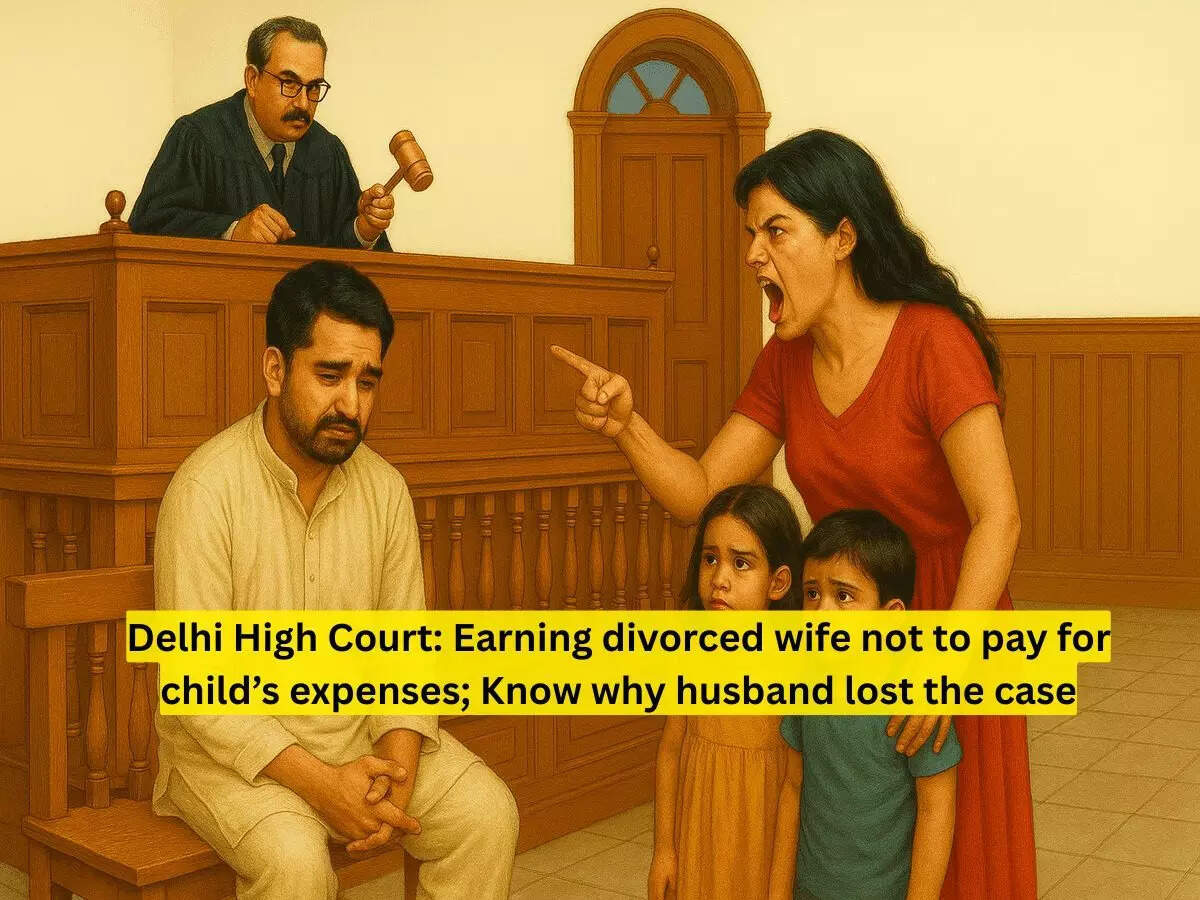The high court said she (wife) needs to do two jobs, one for the office and another after office for upkeep of the child and this contribution of hers cannot be quantified in monetary terms. To quote the High Court in exact terms, the court said, “These psychological and emotional burdens cannot be calculated or addressed through a mere mathematical formula.”
The husband on the other hand claimed that he earns just enough to barely sustain himself, but this disproportionate child maintenance amount ordered by the court is a burden for him. Though the wife had also filed a maintenance plea however, the court rejected her plea but upheld the child maintenance plea. The maintenance amount in this case is payable by the husband to the wife since she has custody of them.
The Delhi High Court said that this case is, in many ways, an acknowledgment – if not a tribute – to all working custodial parents, irrespective of gender, who strive each day to maintain equilibrium between their obligations as caregivers and professionals. The High Court said that even in cases where a father has custody of young and minor children, the challenges he faces are, in essence, not dissimilar to those encountered by a mother in a comparable situation.
While rejecting the husband’s plea, the High Could acknowledged that while societal perception may traditionally lean towards the belief that a father’s role is rendered more difficult due to professional commitments and prevailing gender expectations, the same logic must equally apply to working mothers, who often navigate identical—if not heightened— burdens.
Read below to learn more about the legal arguments in this case and what divorced fathers should know.
How did this case start?
According to the judgement of the Delhi High Court dated May 13, 2025, here are the details:
- July 7, 2014: A Delhi based person married a lady who is employed as a stenographer in court. The marriage between them happened following all Hindu rites and ceremonies. From this marriage two children, a son and a daughter, were born in 2015 and 2019 respectively.
- June 2021: She left her husband and has been living separately since then.
- April 2022: She filed a complaint under Section 12 and Section 23 of Protection of Women from Domestic Violence Act, 2005 against her husband and his family members. Section 23 is used when a spouse who is not divorced yet and seeks payment of interim maintenance money.
- August 17, 2023: The lower court refused to grant any maintenance money to the wife but ordered the husband to pay Rs 50,000 per month in favour of both their children’s maintenance.
Delhi High Court refers to this Supreme Court judgement which said usually fathers have to bear expenses of children unless the mother is earning sufficiently
The Delhi High Court said:
- The Supreme Court has held that monetary relief under Section 20(2) of Protection of Women from Domestic Violence Act, 2005, granted in favour of the aggrieved woman or the children, must be adequate, fair and reasonable.
- It was also held that the living expenses of a child must include not just food, clothing, residence, medical and educational costs, but also reasonable expenses for extra-curricular or coaching classes; and that ordinarily, the father should bear the educational expenses of the children, unless the mother is earning sufficiently, in which case the costs may be shared proportionately.
The above precedent was applied by Delhi High Court in this case and the court said:
- In the present case, a significant aspect that merits attention is that the respondent (Wife), who is admittedly employed in the District Court—a role that demands punctuality, mental acuity, and undivided focus—has been consistently balancing her professional responsibilities with the demands of her personal life.
- While it was contended by her counsel that she faces multifaceted challenges as a “single parent,” this Court is of the view that such terminology requires a nuanced understanding.
- A custodial parent, though performing parental responsibilities independently, does not live a solitary existence; rather, he or she forms a familial unit with the children in their care. The presence of children, and the responsibilities that accompany their upbringing, confer upon such an individual the character of a family, not of a person leading a singular or isolated life
- The maintenance is not meant to belittle the non-custodial parent, nor is it a measure of punishment. Similarly, the custodial parent should not be viewed as someone seeking charity or alms.
- Maintenance is not a favour; it is a recognition of shared parental responsibility, and of the child‘s right to be supported.
- This Court is equally cognizant of the fact that maintenance must not result in unfair financial burden on the father, especially when the wife is earning and has been awarded no separate maintenance for herself.
Delhi High Court answers why wife is not required to pay equal share of maintenance for their children
The Delhi High Court said:
- To deal with the argument that the respondent (wife) herein is working and is thus financially and otherwise capable and empowered to not only take care of the children and her career but also, therefore, not seek maintenance, this Court is of the view that even in cases where a father has custody of young and minor children, the challenges he faces are, in essence, not dissimilar to those encountered by a mother in a comparable situation.
- While societal perception may traditionally lean towards the belief that a father’s role is rendered more arduous due to professional commitments and prevailing gender expectations, the same logic must equally apply to working mothers, who often navigate identical—if not heightened— burdens.
- In the present case, what stands out is that the respondent – a woman employed in a demanding position that requires sustained concentration, discipline, and extended working hours—is not seeking maintenance for herself but solely for the children born out of the wedlock.
- This, despite the fact that the petitioner earns nearly twice her income. The respondent continues to shoulder the primary responsibility for the children’s upbringing while simultaneously discharging her professional duties with diligence.
- The Courts below have rightly taken into consideration the fact that both minor children are studying in a School. It has also been noted that the elder child was enrolled in the same school even during the time when the parties resided together, and thus, the standard of schooling and related expenditure had already been a part of the household‘s financial planning. The continuation of the same educational institution ensures stability for the children and aligns with the standard of living they were accustomed to while living with both the parents. In cases such as the present one, where the mother is both the primary caregiver and a working woman managing the entirety of the children‘s daily lives, her non-financial contributions must be duly acknowledged, and a mechanical 50:50 sharing of financial liability cannot be imposed.
- It is also an admitted fact that the wife is earning a net monthly income of approximately Rs 75,000 to Rs 80,000. On the other hand, the husband‘s monthly income has been assessed at around Rs 1,75,000. In such circumstances, it would be just and equitable that the financial responsibility towards the upbringing of the minor children is shared more by the father of the children.
Thus the Delhi High Court rejected the husband’s plea for making the wife liable to pay equal maintenance.
Saurav Agrawal, Advocate, Delhi High Court says: “The court’s paramount focus is the child’s welfare, ensuring a standard of living and dignity comparable to what they would have enjoyed with both parents, extending beyond mere sustenance to include their self-esteem, education continuity, lifestyle, and opportunities. The invaluable non-monetary contributions of a custodial parent, particularly a working mother, such as emotional support, homework supervision, and daily care, are explicitly recognized as a full-time responsibility not measurable monetarily, thus precluding a mechanical 50:50 sharing of financial liability. Maintenance is not a punishment or charity, but a recognition of shared parental responsibility and the child’s inherent right to support.”

